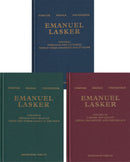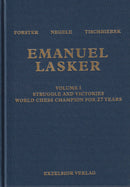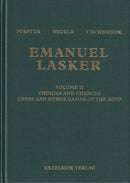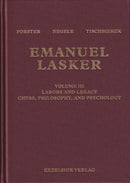Description
Emanuel Lasker Volume 1, 2 & 3 (all 3 books)
by Richard Forster, Michael Negele & Raj Tischbierek
The complete trilogy on the second World chess champion, Emanuel Lasker. It is a major rework of the German edition of 2009, completely translated into English.
Volume 1: Struggle and Victories - World Chess Champion for 27 Years
Volume one covers Emanuel Lasker's youth and school days and the history of his family. It contains a detailed appreciation of his work and achievements as a mathematician. His life and times in London and in the United States are covered by the renowned chess historians Tony Gillam and John Hilbert. It examines also Lasker's contributions to the art of the chess problem and the endgame study.
The chess-specific part is rounded off by Mihail Marin and Raj Tischbierek with detailed game annotations. Raj Tischbierek analyzes Lasker's match with Siegbert Tarrasch for the world championship 1908.
CONTENTS:
1 Michael Negele: A Biographical Compass, Part I
2 Wolfgang Kamm & Tomasz Lissowski: Ancestors, Family, and Childhood
3 Tony Gillam: Lasker in Great Britain
4 John Hilbert: Lasker: The American Views
5 Joachim Rosenthal: Lasker and Mathematics
6 Jürgen Fleck: Lasker’s Endgame Studies
7 Ralf Binnewirtz: Lasker’s Chess Problems
8 Raj Tischbierek: The Battle Lasker vs. Tarrasch
9 Mihail Marin: Dominator of the Chess World
Volume 2: Choices and chances chess and other games of the mind
In this second volume, Mihail Marin and John Donaldson shed new light on some of Lasker's most important encounters in the middle part of his chess career, starting with the famous tenth match game against Carl Schlechter and culminating in his famous victory at New York 1924.
Richard Forster examines the bitter aftermath of this pivotal event, which contributed to Lasker's subsequent long withdrawal from chess. The volume also offers an in-depth view of Lasker's dedication to various mind games beyond chess, with expert analysis of his achievements and contributions to Go and bridge by Theo van Ees/Christian Wohlfarth and Bob van de Velde.
Wolfang Angerstein contributes a detailed essay of Lasker's own board game Lasca, with an appendix on checkers and Salta, and Lasker's contributions to the fledgling field of game theory are lucidly exposed by Jörg Bewersdorff. Finally, Lasker's life in the United States and Berlin between 1902 and 1914, as well as his later years in Holland, are covered with many new biographical insights by Michael Negele, Richard Forster, and Bob van de Velde, with a special contribution by Floribert Baudet on Lasker's unique friendship with the mathematician Han Baudet.
CONTENTS:
Chapter 1 - A biographical compass: Part II
Chapter 2 - Lasker in Holland
Chapter 3 - Lasca-A Strategic Mind Game
Chapter 4 - Lasker and Go
Chapter 5 - Lasker as a Bridge Expert
Chapter 6 - Emanuel Lasker and Game Theory
Chapter 7 - The New York 1924 Tournament
Chapter 8 - The New York Controversy
Volume 3: Labors and Legacy Chess, Philosophy and Psychology
This final volume of the Lasker trilogy covers the later part of his life from 1914 onwards and his manifolds ambitions and writings in chess and science. The biographical compass by Richard Forster shows the ups and downs of the world champion during World War I, his loss of the world championship, the subsequent economic crisis in Germany, the raise of the Nazis, and Lasker’s escape, illustrated with dozens of private documents and letters. Sergey Voronkov paints a detailed picture of Lasker’s fantastic tournament successes in Russia between 1896 and 1936 as well as the frightening circumstances of Lasker and his wife’s life in Soviet Russia in the mid-1930s. Jan Sprenger, Marco Baldauf, Ulrich Sieg, and Fernand Gobet share illuminating thoughts on Lasker’s endeavors as a (Jewish) intellectual in the post-war era, his scientific ambitions as a philosopher as well as his late unpublished work on psychology, which is discussed here for the first time ever.
Egbert Meissenburg and Richard Forster follow with a meticulous overview of Lasker’s rich oeuvre as a writer on chess and other games, mathematics, philosophy, and much else, with translation into more than twenty languages. Herbert Bastian analyzes in detail Lasker’s impact as a chess writer and teacher, while Mihail Marin provides fresh insights into Lasker’s best games and spectacular success in his sixties, when in Moscow 1935 he still kept up with the world’s best.
CONTENTS
- A Biographical Compass, Part III, by Richard Forster
- Lasker and Russia by Sergey Voronkov
- Lasker, The Philosopher by Jan Sprenger & Marco Baldauf
- Lasker and Judaism by Ulrich Sieg |
- The Psychology of Games by Fernand Gobet
- Emanuel Lasker’s Chess Columns by Richard Forster
- Bibliography of Lasker’s Writings by Egbert Meissenburg
- Lasker as a Chess Teacher by Herbert Bastian
- An Impressive Coda by Mihail Marin
Payment & Security
Your payment information is processed securely. We do not store credit card details nor have access to your credit card information.








